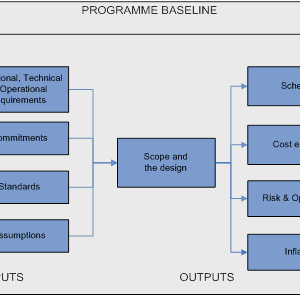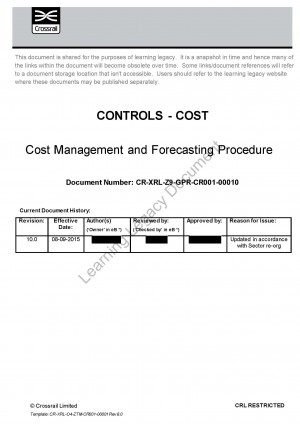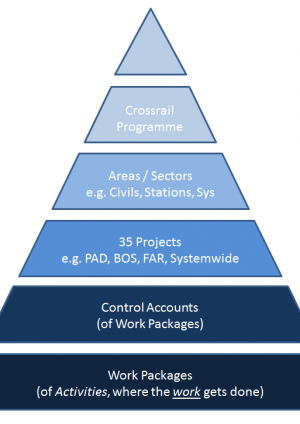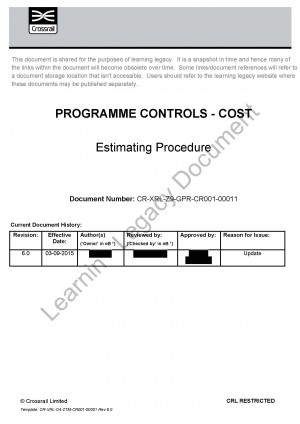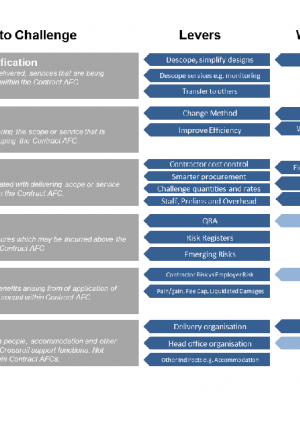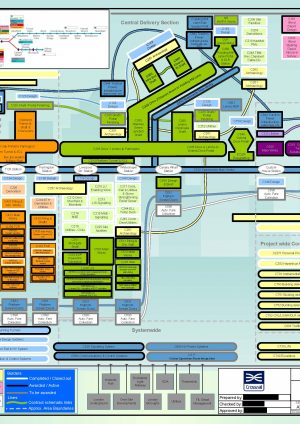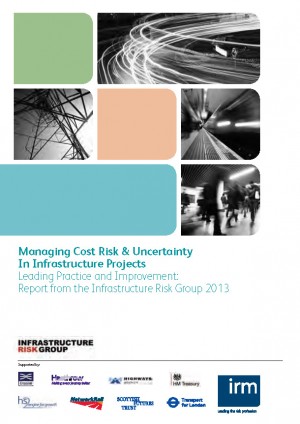As a £14.8bn programme in the public eye, the need to manage costs and ensure value for money is paramount. The creation of an initial control baseline was critical in satisfying sponsors and achieving the ‘green light to proceed’ and was the fundamental basis upon which costs were controlled. The baseline is supported by a standardised work breakdown structure allowing variances in cost performance to be identified and managed effectively.
The Cost Management function in Crossrail is responsible for:
- Providing programme level cost planning/estimating, budgeting, forecasting, reporting, managing and control of all the costs associated with the programme;
- Minimising the Anticipated Final Cost (AFC) and driving best value;
- Ensuring the Anticipated Final Crossrail Direct Cost (AFCDC) remains within the funding envelope
- Integrating Cost Management requirements with Industry Partner practices and ensuring that they deliver in accordance with the Crossrail Sponsors’ Requirements;
- Setting robust cost baselines pre and post contract award;
- Controlling cost through pro-actively identifying and managing change;
- Operating a robust cost forecasting process to provide the appropriate financial provision;
- Providing reliable, accurate and timely cost performance data;
- Integrating with programme financial reporting; and
- Being efficient to operate and align with the projects systems architecture.
This cost management learning legacy seeks to share the key cost management procedures used on the Programme which may be of interest to other projects establishing their own cost management regimes including:
- Cost Management and Forecasting Procedure: A single procedure providing timely and consistently accurate cost information and which pro-actively supports the delivery of Crossrail’s cost objectives;
- Estimating Procedure: A centralised estimating approach, based on using consistent procedures, and providing sufficient capability for Crossrail to provide granular estimate detail by contract, in addition to robust capex and opex benchmarking to enable value for money (VFM) demonstrations to stakeholders;
The learning legacy also includes lessons learned on key aspects of cost management including setting up and implementing Earned Value (including the use of ‘earned schedule’ as a supplemental performance measure focused on schedule progress), Crossrail’s Approach to Estimating, and developing the Initial Control Baseline which was fundamental to achieving full delegated authority and funding to deliver the programme, including the optimisation and de-risking of the delivery programme, leading to significant savings.
| Summary |
Publication date |
Document Type |
Topic area: Cost Control This paper describes the use of Project Bank Accounts on the Crossrail project to encourage fair payment and protect subcontractors.
It would be of interest to any project looking to ensure they set up processes to pay their contractors and sub-contractors fairly and in a timely manner, in line with best practice as re...
|
09/07/2018 |
Micro-report |
Topic area: Cost Control This paper outlines both process and `ethos` of Schedule of Cost Component(SoCC) Cost Verification activity on the Crossrail Programme.
The paper outlines how the Cost Verification function provides both, assurance that the Contractors financial systems and controls are aligned to Works Information requirements, and to...
|
09/07/2018 |
Micro-report |
Topic area: Cost Control This paper explains Crossrail’s response to the Government’s 2010 Comprehensive Spending Review, which instigated a comprehensive value management exercise to optimise the programme. This lead to increased sponsor confidence in Crossrail’s affordability, leading to the issue of a Positive Project Revi...
|
09/07/2018 |
Micro-report |
Topic area: Cost Control This procedure is an integral component to the Crossrail Controls approach and toolset, and applies to all functional departments in the Crossrail Programme responsible for managing and reporting cost. This procedure details the systems, processes, procedures and tools required to identify, collect, integrate and analy...
|
27/09/2016 |
Good Practice Document |
Topic area: Cost Control This micro-report gives an overview of how the work breakdown structure (WBS) has been developed and how it is maintained and controlled across the Crossrail programme through the Cost Management System (PRISM). It will be of interest to all those delivering major and complex projects.
|
27/09/2016 |
Micro-report |
Topic area: Cost Control This document sets out the role of the Programme Controls Estimating Team and the procedures and approach undertaken in the preparation of estimates and other activities that were identified as being the responsibility of the estimating team.
This procedure applies to the central estimating team and identifies the inte...
|
27/09/2016 |
Good Practice Document |
Topic area: Cost Control The aim of the Crossrail performance measurement regime was to provide a comprehensive, consistent, timely and reliable view of the programme’s performance that predicted performance, and triggered management action to positively influence the outcome. Earned Value (EV) was one indicator of performance and was used i...
|
26/02/2016 |
Micro-report |
Topic area: Cost Control This report summarises Crossrail’s approach to Estimating, to provide predictability around capital investment and operating costs as well as the critical evaluation of affordability and value for money. This report sets out the role of the Programme Controls Estimating Team, the procedures and approach undertaken as...
|
26/02/2016 |
Micro-report |
Topic area: Reporting Crossrail is committed to safely deliver a world class railway, on time, and at the lowest possible cost. It is required of all involved in the delivery and management of the programme to drive efficiency and maximise value for money.
In 2015, the Crossrail leadership team agreed cost reduction targets with key project...
|
14/03/2017 |
Micro-report |
Topic area: Change Management This micro-report describes the process to establish the Crossrail Programme Baseline and the components of the Baseline, including the high level Work Breakdown Structure.
|
27/09/2016 |
Micro-report |
Topic area: Risk Management In 2015 Infrastructure UK undertook a review of the cost of infrastructure projects in the UK and how this cost could be reduced. One workstream researched the management of cost risk and uncertainty throughout the project lifecycle, the incentive being to significantly reduce the cost of projects by curbing unnecess...
|
30/12/2013 |
Good Practice Document |


